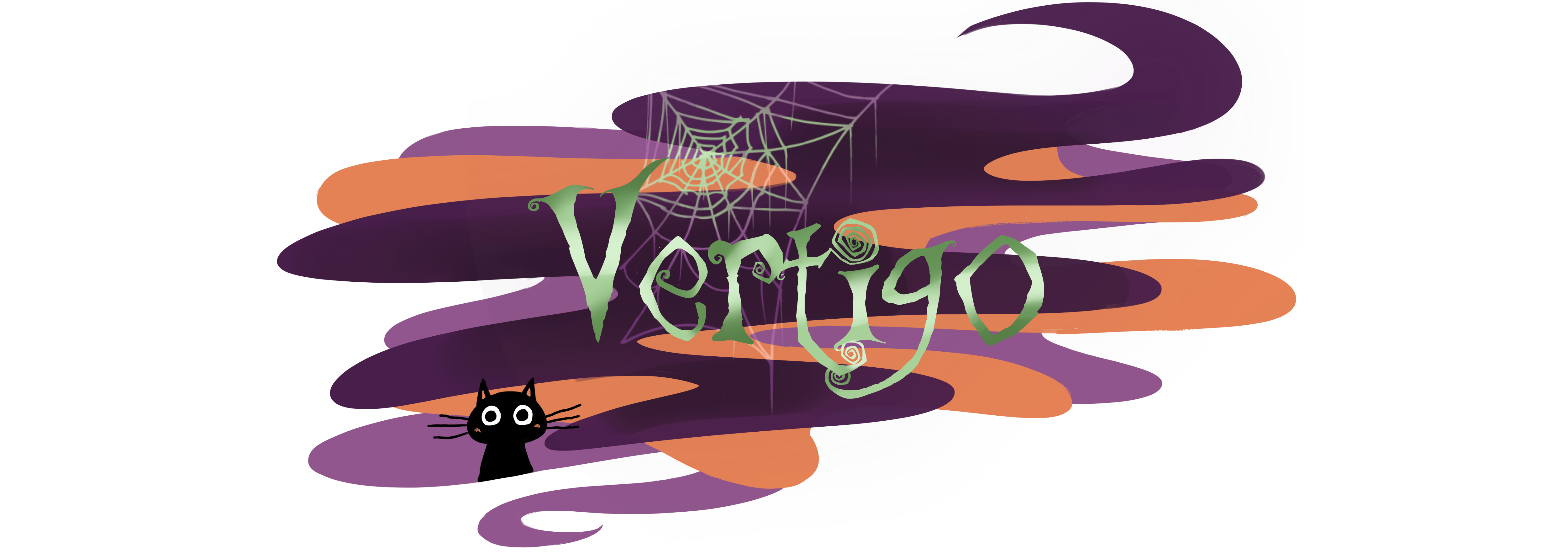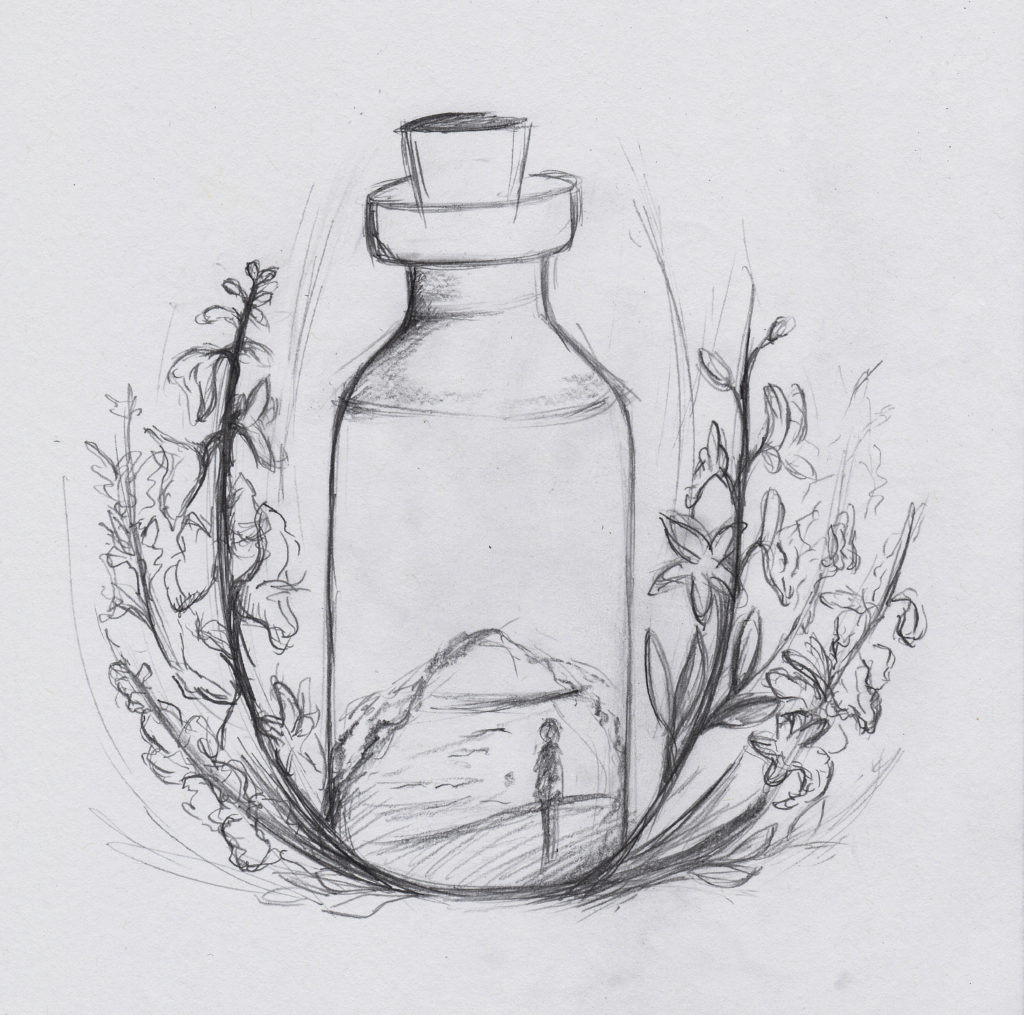by Grace Huang
Art by Catherine Hwu
Issue: Ataraxia (Spring 2018)
Celestine throws the ashes into the river as he watches.
She doesn’t say goodbye.
Raven falls asleep for the first time in days; all he can see in his dreams are the clouds and a fire burning bright above it. He assumes it’s their love.
⁂
The girl who sits next to him in physics doesn’t show up to class the next day. She doesn’t show up the day after that. Or the next one hundred and seven days.
Only after she’s declared officially missing does Raven realize whose ashes Celestine had been holding that day.
⁂
“What did you do?” he asks when she stands on her tiptoes and presses a soft kiss on his cheek. They both know what he’s talking about.
Her face doesn’t change, although her eyes do. He can see it. They lose the glimmer of joy, and are replaced with the darkness of the truth. Her eyes look angry, cold, everything Raven didn’t want them to be, at least at one point.
“You wouldn’t believe me.” Her voice is a whisper, but the urge to steer the topic away from what he’s hinting at is more than clear.
“You threw away her ashes right in front of me,” Raven responds, squeezing her hand a little too tight as he pulls her through the crowd. She squeaks, and he loosens his hand. “So what did you do?”
She pulls him close to her, and leans up. Her lips tickle his ear as she whispers, “I killed her.”
And when Raven recoils out of the indistinguishable emotions that flare up in his heart, he looks into her eyes – really looks into them – and realizes that her eyes are lit with the flame of excitement.
And realizes that she’s insane.
⁂
“I told you.”
He’s staring at her, through the glass in the detention center. She’s seated on the other side, handcuffed. There’s a guard watching from her side, and another from his side.
“I told you you’d get caught.”
Celestine lets out a breathy sigh. “Oh well.” His hand tightens into a fist underneath the counter. “I thought this would happen. It was sloppy. If only I had a second chance.”
He feels sick, suddenly, and his stomach churns unhappily.
“I should go,” he says hurriedly, swallowing to keep down the bile building up in his throat.
“Oh, okay.”
She watches him as he stands and tugs at his jacket. He lifts his hand to pull his hood over his head but realizes too late that he raised the wrong one.
“What’s that?” Celestine asks curiously. He flashes the flower briefly in her line of sight.
“A flower. From the garden. It’s pretty. …I thought I should give it to you.”
Celestine hides a laugh behind her hand. His heart flutters, and not in the good way that he wants it to flutter.
Raven hands it to the guard, and leaves the detention center. While he’s pushing open the door to the police station, he hears a laugh, like a witch’s cackle. A guard barks for the person to shut up, and they do.
He already knows who it was.
⁂
Yet he doesn’t know why she laughed the way she did that day, and so he asks his mother about that flower.
“They’re called fraxinellas,” his mother responds, and then goes back to watering the plants. He wanders away, and she doesn’t notice.
When Raven searches them up, and unwillingly finds their meaning in the language of flowers, he feels like he could vomit.
⁂
He’s a witness at her trial. All he does is further prove her guilt.
He doesn’t feel culpable.
He learns that the victim’s name was Teine Yuuta, a girl around their age, and that Celestine had poisoned her, and then burned the body in the school incinerator before collecting the ashes and throwing them into the river.
Raven presents the bottle that she had given him – the bottle she had been carrying the ashes in before she had dumped them out onto her palm. It takes forensics mere minutes to lift her fingerprints from the bottle.
All the time, she’s sitting in the defendant’s chair. The only time he dares to look back at her, she’s twirling the fraxinella flower he gave her between her fingers.
He’s dismissed from the witness stand, and regrets giving her that flower. She didn’t deserve it.
It doesn’t take long for the jury to reach a decision.
“Celestine Ashe, you are guilty on the charge of first-degree murder.”
He doesn’t feel culpable at all.
⁂
She’s put on death row. Her execution is scheduled for some years later, but she requests one in a few weeks. Her parents aren’t allowed to attend. No one is.
All they get is the body, and the guard telling them that she had no last words. And, as if to tie everything back together, her parents burn the body. They keep the ashes in a bottle by the front door.
Raven steals it, and when he’s back at the river where it had all gone wrong, he smashes it open. He ignores the cuts from broken glass shards on his fingers as he gathers all the ashes, and then watches them float away in the river’s current.
He collects the glass shards in a bag and promises to leave them on her grave – especially the ones stained with his blood.
⁂
“I… I’m sorry?”
“Fraxinella,” he repeats. His face is etched with frustration. “I need three bouquets of them. Don’t you have them?”
“Of course we do,” the florist answers, rather defensively, “but, you said they were for a vigil?”
“Yeah,” he responds flippantly, opening and digging through the pockets of his wallet in an attempt to find his credit card. When he concedes that he must have left it at home, he gives himself a mental pat on the back for remembering to stuff his wallet with twenty-dollar bills.
Hesitantly, the florist walks away and disappears into the hallways of the store. Minutes later, she reappears, three bouquets in her arms.
“You… you do know what fraxinella means, right?”
“Yeah. Fire.” He pays her in cash, tells her to keep the change, and leaves.
So a week later, the neighborhood is gathered around a framed picture of her in her house, the only light in the darkness being a single candle by her picture. Three bouquets’ worth of fraxinella surround the table where it’s sitting, its petals glowing in the candlelight.
No one else knows that he’s sending her off with a wish to burn in hell.
⁂
The last time he hears her name is years later, meeting with his cousin’s boyfriend. He’s Scottish, so for the sake of his anthropological studies, Raven meets with him.
“What is ‘fire’ in Scottish Gaelic?” Raven asks the question about halfway through the interview, solely on a whim, and doesn’t think he regrets it. After all, he already knows how to say fire in fifty seven other languages.
“Teine.”
And even though he shouldn’t, he laughs at the bitter irony of it all.

